Ex-Lions OC Ben Johnson loses first game as head coach headlines didn’t exactly shock Motor City—he left for Chicago, the Bears promptly flopped in Week 1, and the Lions struggled without him. But beneath the surface, this isn’t just about failures—it’s about opportunity.
Let’s dissect how Detroit actually benefits from this development, what to expect as the Lions recalibrate, and why focusing on stability might matter more than nodding at Johnson’s early missteps.
Ex-Lions OC Ben Johnson Loses First Game as Head Coach — But the Signal Is Clear
Ben Johnson’s debut as a head coach ended with a 27–24 loss to the Vikings, blowing an 11-point lead and committing enough flags to raise eyebrows. It wasn’t a fluke; his offense looked disjointed, especially in the fourth quarter—mirroring some of the Lions’ inefficiencies in Week 1 following his departure.
But here’s the real point: Detroit isn’t scraping uphill—it’s leaning into a new chapter. The narrative isn’t that Johnson failed; the narrative Detroit needs is how the Lions are going to move forward without him.
Lions Struggled Without Johnson—but That’s Just the Starting Point
Detroit’s offense, once the league’s most prolific, sputtered early in Week 1 against Green Bay. With Johnson gone, the unit lacked rhythm, scoring their only touchdown with less than a minute left. The offensive line looked shaky, backs were stuffed, and quarterback Jared Goff had minimal time to throw. It was growing pains, yes—but not unexpected growing pains.
Johnson’s departure stung, especially for Lions fans who reveled in the explosive offense he helped architect. But transitions aren’t failures—they’re opportunities to adapt. The Lions now script a different style, and Week 1 simply reminded everyone that change needs time to take root.
What Detroit Must Do Next: Four Key Moves
1. Embrace John Morton’s Playcalling and Plan
Morton needs to reset expectations. He may not have Johnson’s creativity, but he can build rhythm. Short passes, incremental gains, and establishing identity now are more important than jumping into hero ball.
2. Build New Identities, Don’t Mimic the Old
Detroit’s identity shouldn’t be reactive—it should be proactive. Emphasizing physicality, smart clock management, and adapting tempo based on strengths will make the offense sustainable.
3. Lean on Playmakers, But Share Responsibility
Players like Amon-Ra St. Brown and Sam LaPorta must lead by example—but the offense shouldn’t be single-threaded. Spreading production keeps defenses off balance and magnifies each playmaker’s impact.
4. Tighten the Offensive Line—Front’s the Foundation
Detroit’s line took a beating. Fresh play design won’t stick if Goff doesn’t have time. The front five must establish identity early: zone runs, combo blocks, and using quick throws to buy time.
Detroit’s Advantage: Stability Beats Flashy Changes
Detroit’s current strength lies in continuity—Dan Campbell’s leadership, Brad Holmes’ roster construction, and a culture of grit. Unlike Johnson’s Bears, who are defining a new era in Week 1, the Lions are adapting within a winning framework. That’s strength.
Fans should watch how Detroit looks in Week 2 and beyond—not for instant fireworks, but for commitment to smarter pacing, more precise fundamentals, and purposeful execution.





